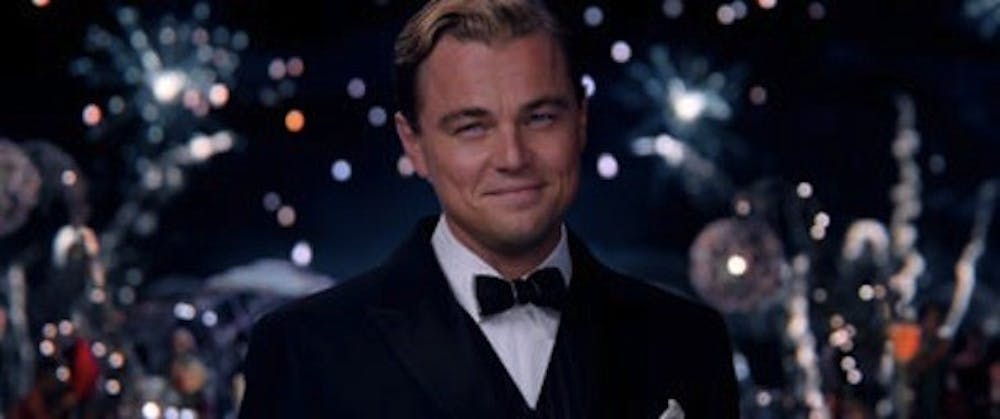Baz Luhrmann's version of the quintessential American yarn of Jay Gatsby and his inevitable decline at the hands of the decadence and excess of the Jazz Age is a visual technicolor rhapsody.
As a director, Luhrmann can be divisive amongst moviegoers. After the questionable outing that was the arduous "Australia," it's surprising to see him make a film like "The Great Gatsby." Although on the surface it seems gaudy and flamboyant, it has a reserved center, displaying a maturity in Luhrmann's direction.
Luhrmann reunites with a fuller faced Leonardo DiCaprio ("Django Unchained") 17 years after his neon fantasy version of "Romeo + Juliet." Considering the over-the-top parties Gatsby throws, it's not hard to see how Luhrmann was attracted to F.Scott Fitzgerald's generation defining novel.
The plot of the film remains the same as the novel, though with an added embellishment. The film frames the story with Nick Carraway (Tobey Maguire, "Spider Man") as he sequesters himself into a rehab. Carraway, filled with alcohol and regrets, seeks help when his doctor suggests he write to calm his nerves.
Recalling his memory by actually writing "The Great Gatsby," Carraway retells the events of moving to West Egg, Long Island. Unknown to him, Carraway has set down next to the enigmatic Gatsby's mansion.
Eventually, Gatsby asks Carraway if he would invite Daisy Buchanan (Carey Mulligan, "Drive") for tea. Carraway, who sees this as an opportunity to show a kind gesture of friendship toward Gatsby, sets off a chain of events that lead to Gatsby's demise.
Luhrmann lets Fitzgerald's work speak for itself, knowing full well that the strength of the novel is in the power of its words.
At times, the screenwriting duo of Craig Pierce ("Moulin Rouge!") and Luhrmann draws parallels a little too closely to the life of Fitzgerald. Luhrmann culls from Fitzgerald's life and letters in order to address the opulence that surrounds Gatsby's world.
The script connects the real life friendship between Ernest Hemingway and Fitzgerald by fictionalizing it in the Hemingway-esque character of Tom Buchanan, that Joel Edgerton ("The Thing") plays as a booming brute, and deconstructing Fitzgerald's personality between Carraway and Gatsby. This tenuous relationship eventually coalesces into an explosive confrontation over Daisy.
DiCaprio's performance as the golden haired midwestern boy who struck it big and eventually retreated to his empire of extravagance is more humanizing than Robert Redford's performance in Jack Clayton's version of "The Great Gatsby." Redford was at the pinnacle of his golden boy persona but was icy and too reserved. Dicaprio finds Gatsby's emotional core and exerts it for all its delirious net worth.
The weakest link, though, is unfortunately the source of Gatsby's obsession. Mulligan simply doesn't embody the character of Daisy well enough to make the audience believe that Gatsby would dedicate his life to resurrecting the past in order to blaze a future for them. Compared with Mia Farrow's performance in the aforementioned Clayton version, with her sharpened cheekbones, and a voice that literally sounded "full of money," as Fitzgerald described, in Farrow the audience believed that a man would go to great lengths to win her over. In Mulligan, we do not.
It's also evident that much care went into recreating 1920's New York. From Simon Duggan's slick, expressive cinematography to Jay-Z's curated soundtrack, production design by Luhrmann's wife, Catherine Martin, and an evocative score by Craig Armstrong, the set becomes fevered, but believable. Luhrmann ties it together with references to films such as Alexander Mackendrick's "Sweet Smell of Success" to Billy Wilder's "Sunset Boulevard."
Much ballyhoo has been made about the 3D element, which seems like a novel idea at first. But the limits of the technology are evident. Blurry shots and unfocused backgrounds make the picture fall flat.
Luhrmann and Piece's script tries to fit in as many motifs of the original novel as possible, including the eyes of doctor T.J. Eckelberg hovering over the fiery expanse between New York and West Egg. Luhrmann also includes the troubled relationship between Myrtle and her husband George Wilson, played by Isla Fisher ("Rango") and Jason Clarke ("Zero Dark Thirty"), respectively.
But the film attempts to fit in as much as possible. At a hefty 143 minutes, it feels muddled at times.
Suppose Luhrmann was intrigued by Fitzgerald's novel the same way he was attracted to Shakespeare's "Romeo and Juliet." Parallels between the two narratives unhinge at the limits of the character's grasp of control. The machinations of a few small acts condemn both Romeo and Gatsby to their death.
Though "Romeo and Juliet " was a tragedy about the irrationality of youth, Luhrmann's "The Great Gatsby" is about the projection of hope and the eventual victims of excessive hubris. Our hopes remain out of our grasp, like Gatsby's silhouette trapped looking across the Long Island sound upon that shimmering green light.
We, too, are borne back, ceaselessly into the past.
dkahen-kashi@theeagleonline.com





